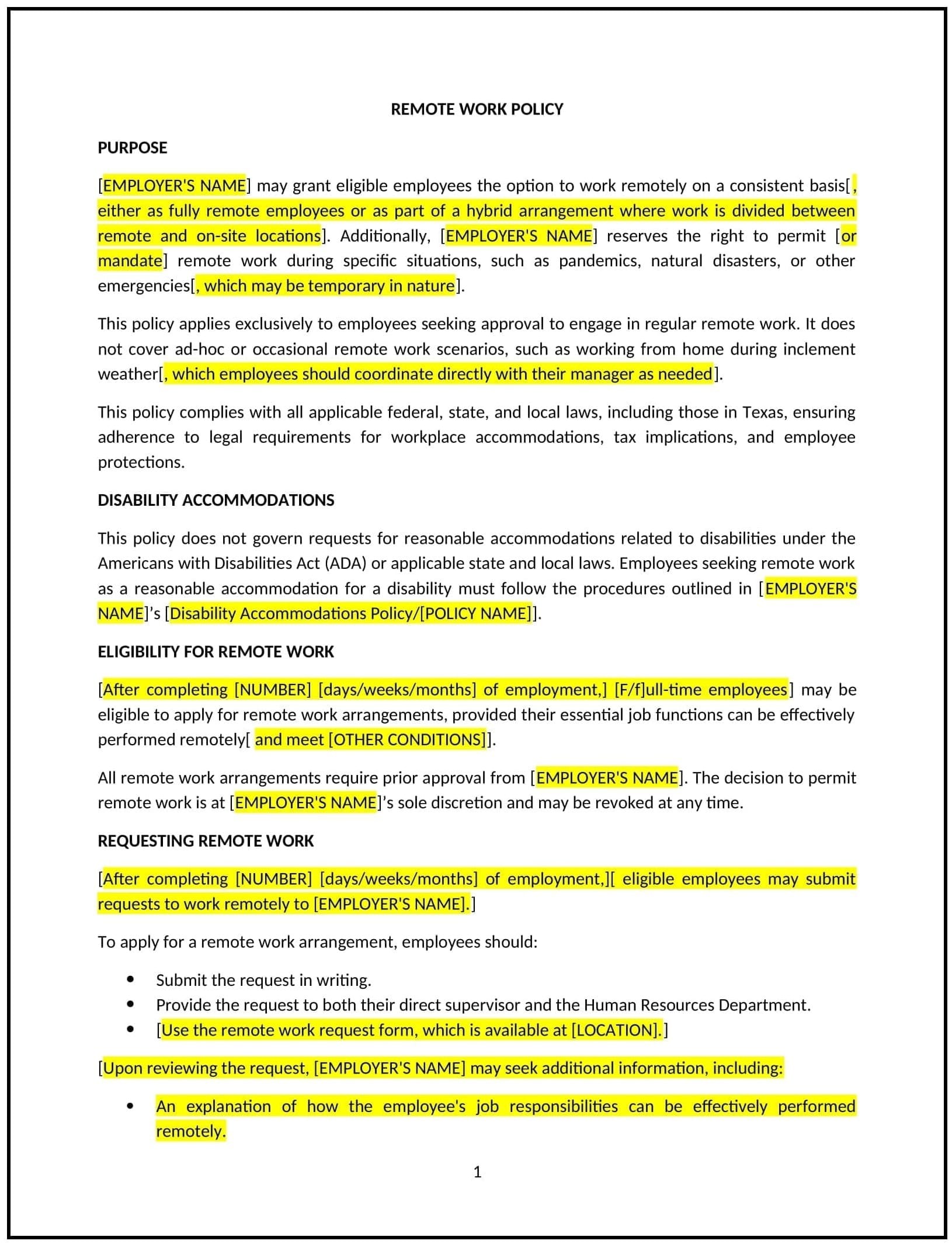Got contracts to review? While you're here for policies, let Cobrief make contract review effortless—start your free review now.

Customize this template for free
Remote work policy (Texas)
This remote work policy is designed to help Texas businesses establish clear guidelines for employees who work remotely, whether on a full-time, part-time, or occasional basis. The policy outlines expectations for remote work, including communication, performance, security, and company-provided equipment, while promoting compliance with Texas state laws and federal regulations.
By adopting this policy, businesses can promote productivity, ensure consistency in remote work practices, and provide employees with the flexibility to manage their work-life balance effectively.
How to use this remote work policy (Texas)
- Define remote work expectations: Clearly explain what is expected of employees when working remotely, including work hours, availability, and communication expectations. Specify whether employees must be available during set hours or if there is flexibility in scheduling.
- Set performance standards: Outline how employee performance will be evaluated while working remotely. The policy should emphasize that remote work does not mean reduced accountability, and employees should meet their productivity and performance targets as they would in the office.
- Address communication protocols: Establish guidelines for communication, including how frequently employees should check in with managers, the preferred communication tools (e.g., email, video conferencing, messaging apps), and the response time expectations.
- Provide company equipment and technology: Specify what equipment, tools, or technology the company will provide to employees for remote work, such as laptops, phones, or software. If employees are responsible for their own equipment, outline any stipends or reimbursement procedures for purchasing work-related tools.
- Ensure data security: Set clear guidelines for maintaining data security while working remotely, including how employees should protect company data, use secure Wi-Fi networks, and handle sensitive information. The policy should also specify the use of company-approved security software, such as VPNs or encryption tools.
- Address time tracking and overtime: If applicable, explain how employees should track their work hours and how overtime will be managed for remote workers. Ensure that the company complies with Texas state laws and federal regulations, such as the Fair Labor Standards Act (FLSA), regarding overtime pay.
- Promote work-life balance: Encourage employees to establish a routine that promotes work-life balance, including taking breaks and setting boundaries between work and personal life. Provide guidance on maintaining mental and physical well-being while working remotely.
- Set up expectations for office visits or in-person meetings: Specify whether remote employees are required to attend in-person meetings or visit the office periodically, and outline any travel or accommodation provisions for those visits.
Benefits of using this remote work policy (Texas)
This policy offers several benefits for Texas businesses:
- Increases flexibility: The policy allows employees to work remotely, which can improve job satisfaction, reduce commuting time, and support better work-life balance.
- Improves productivity: By setting clear performance expectations and communication protocols, businesses can ensure that employees remain productive while working remotely.
- Supports business continuity: Remote work allows businesses to continue operations in the event of emergencies, weather disruptions, or other unforeseen circumstances that may prevent employees from working in the office.
- Reduces overhead costs: By encouraging remote work, businesses can reduce costs associated with maintaining office space, utilities, and other resources.
- Enhances employee satisfaction and retention: Offering remote work options can help attract and retain top talent, particularly for employees who value flexibility and autonomy.
- Maintains security and compliance: The policy helps businesses maintain data security and comply with legal requirements by setting guidelines for remote work equipment, technology, and communication.
Tips for using this remote work policy (Texas)
- Communicate the policy clearly: Ensure that all employees are aware of the remote work policy, including the guidelines for performance, communication, and data security. This can be communicated during onboarding or through the employee handbook.
- Provide necessary tools: Ensure that employees have access to the necessary tools, equipment, and technology to perform their jobs remotely. Consider offering stipends or reimbursement for work-related expenses.
- Foster strong communication: Encourage regular check-ins with managers and team members to ensure ongoing communication and collaboration, even when working remotely.
- Monitor performance consistently: Evaluate employee performance based on clearly defined metrics and objectives. Regularly assess how remote work is impacting productivity and adjust the policy as needed.
- Ensure proper security protocols: Make sure employees understand and follow company security protocols for remote work, including how to securely handle and store sensitive data.
- Promote mental health: Encourage employees to take breaks, set boundaries between work and personal life, and maintain a healthy work-life balance while working remotely.